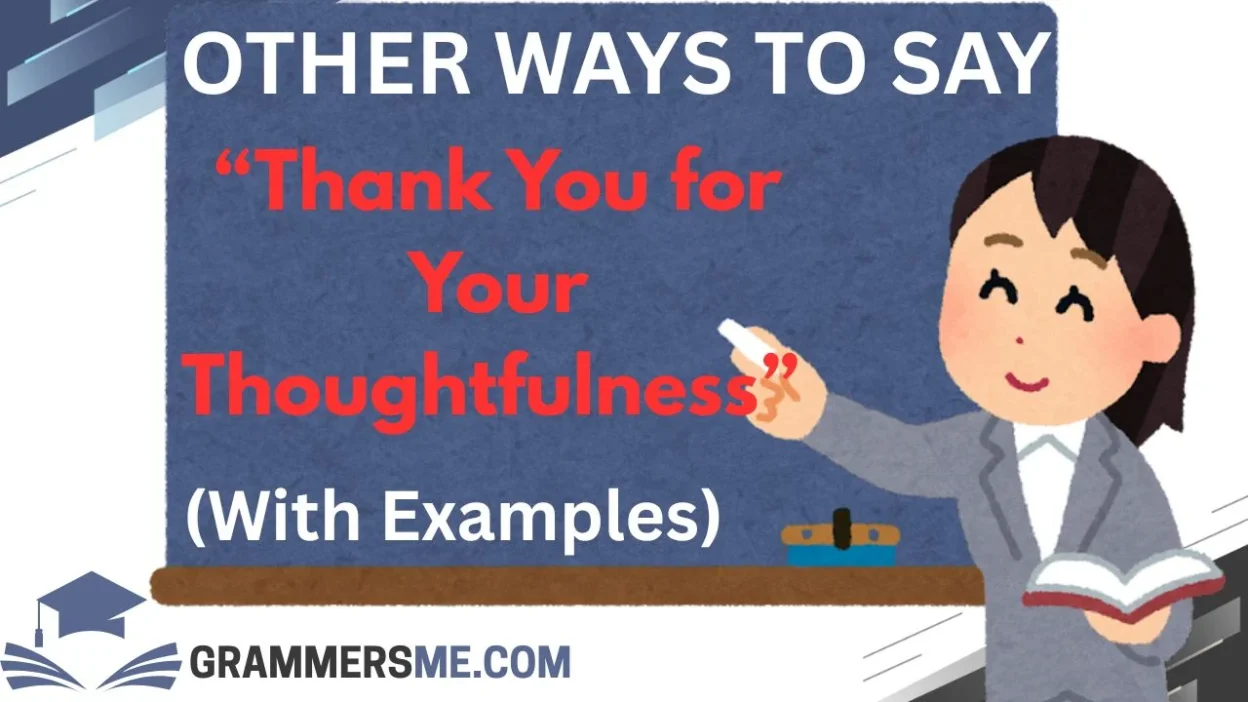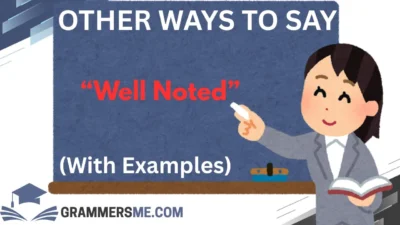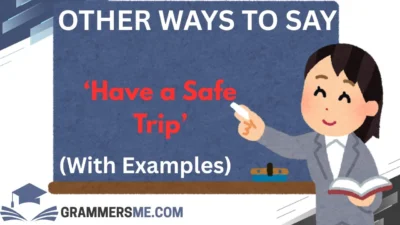Sometimes, a simple “Thank you for your thoughtfulness” doesn’t quite capture the depth of gratitude you feel. Whether someone remembered a small detail, went out of their way to show kindness, or made you feel truly seen—the words you choose matter. In a world where communication is often rushed, expressing heartfelt thanks with care and warmth can leave a lasting impression. This guide offers 30 meaningful alternatives to help you connect more personally and genuinely.
What Does “Thank You for Your Thoughtfulness” Mean?
“Thank you for your thoughtfulness” is a warm, appreciative phrase used to acknowledge someone’s kindness, consideration, or attention to detail. It expresses gratitude for actions that show someone truly thought about your needs or feelings.
Is It Professional/Polite to Say “Thank You for Your Thoughtfulness”?
Absolutely, yes. “Thank you for your thoughtfulness” is both polite and professional. It’s appropriate in emails, thank-you notes, workplace conversations, or personal exchanges. That said, sometimes you want a variation that suits your tone or setting a little better—and that’s where these alternatives come in.
1. I Truly Appreciate Your Kind Gesture
Meaning: A warm way to acknowledge someone’s specific action.
Explanation: This phrase shows that the gesture didn’t go unnoticed and that you genuinely value it.
Example: “I truly appreciate your kind gesture of bringing me coffee on such a busy morning.”
Best Use: When someone does something unexpected but meaningful.
Not Use: For very formal or corporate settings where a neutral tone is needed.
2. That Meant a Lot to Me
Meaning: Emphasizes emotional impact.
Explanation: Perfect when something small made a big difference emotionally.
Example: “Thank you for checking in. That meant a lot to me.”
Best Use: Personal or heartfelt responses.
Not Use: In impersonal or purely professional contexts.
3. I’m So Touched by Your Kindness
Meaning: Shows emotional connection to someone’s thoughtfulness.
Explanation: Conveys vulnerability and genuine appreciation.
Example: “I’m so touched by your kindness—it really lifted my spirits.”
Best Use: When someone’s act feels deeply personal.
Not Use: If you want to keep emotional distance.
4. I Appreciate Your Consideration
Meaning: A professional and sincere way to show thanks.
Explanation: Highlights that the person was mindful of you.
Example: “I appreciate your consideration in adjusting the schedule.”
Best Use: In workplace settings or emails.
Not Use: When the tone needs to be deeply emotional.
5. Thank You for Going Out of Your Way
Meaning: Acknowledges extra effort.
Explanation: Use this when someone did something above and beyond.
Example: “Thank you for going out of your way to help me with the report.”
Best Use: For team members, friends, or thoughtful favors.
Not Use: For minor gestures or casual acts.
6. I’m Grateful for Your Attention to Detail
Meaning: Recognizes care in the little things.
Explanation: Ideal when someone remembers specifics that matter.
Example: “I’m grateful for your attention to detail in the birthday card you sent.”
Best Use: Work, gifts, or any personalized touch.
Not Use: When the act was general or not detail-oriented.
7. I Can’t Thank You Enough
Meaning: Expresses overwhelming gratitude.
Explanation: Shows that words alone can’t capture how thankful you feel.
Example: “I can’t thank you enough for covering for me last minute.”
Best Use: Big favors or significant emotional support.
Not Use: For casual acknowledgments.
8. Your Kindness Didn’t Go Unnoticed
Meaning: Reassures someone their effort was seen.
Explanation: A good choice when someone might not realize the impact they made.
Example: “Your kindness didn’t go unnoticed during such a tough week.”
Best Use: Acts of support or quiet gestures.
Not Use: For highly visible or public acts.
9. Thank You for Thinking of Me
Meaning: Expresses appreciation for being remembered.
Explanation: A classic phrase that’s always warm and thoughtful.
Example: “Thank you for thinking of me and sending that sweet note.”
Best Use: Gifts, messages, or check-ins.
Not Use: In high-stakes or formal contexts.
10. I’m Deeply Grateful
Meaning: Indicates profound thankfulness.
Explanation: Best for emotionally significant moments.
Example: “I’m deeply grateful for your help during my recovery.”
Best Use: When words need to carry emotional weight.
Not Use: For minor or everyday situations.
11. That Was So Thoughtful of You
Meaning: Direct and genuine compliment.
Explanation: A kind phrase that’s versatile and warm.
Example: “That was so thoughtful of you to bring me soup.”
Best Use: Any considerate gesture.
Not Use: For formal communications.
12. I Appreciate the Extra Effort
Meaning: Spotlights someone’s initiative.
Explanation: Encourages and recognizes going above expectations.
Example: “I appreciate the extra effort you put into decorating the space.”
Best Use: Work, events, or shared tasks.
Not Use: When the gesture was simple or routine.
13. Your Support Meant the World
Meaning: Deeply emotional and powerful gratitude.
Explanation: Best when someone was there for you in a big way.
Example: “Your support meant the world to me during that difficult time.”
Best Use: Close relationships and serious moments.
Not Use: Casual thank-you situations.
14. Thanks for Being So Considerate
Meaning: Appreciates mindful behavior.
Explanation: Highlights emotional intelligence in the person’s actions.
Example: “Thanks for being so considerate with your words.”
Best Use: Sensitive contexts.
Not Use: If more formal language is required.
15. I Felt So Seen and Cared For
Meaning: Emphasizes emotional impact.
Explanation: Beautiful phrase when someone understands you deeply.
Example: “With that surprise visit, I felt so seen and cared for.”
Best Use: Intimate or close relationships.
Not Use: In professional emails.
16. I’m Beyond Grateful
Meaning: Exaggerates gratefulness in a heartfelt way.
Explanation: Works well in emotional or joyful moments.
Example: “I’m beyond grateful for everything you’ve done.”
Best Use: Big favors, emotional moments.
Not Use: Casual emails or quick replies.
17. Thanks for Always Being So Thoughtful
Meaning: Consistent appreciation.
Explanation: Great for friends or colleagues who are always considerate.
Example: “Thanks for always being so thoughtful—especially today.”
Best Use: Recurring kindness or long-standing relationships.
Not Use: One-time situations.
18. I’m Honored by Your Kindness
Meaning: Adds humility and respect.
Explanation: A good phrase for formal gratitude.
Example: “I’m honored by your kindness during the ceremony.”
Best Use: Professional, academic, or formal events.
Not Use: In casual or jokey situations.
19. You Really Made My Day
Meaning: Light and joyful appreciation.
Explanation: Great for fun, sweet gestures that lifted your spirits.
Example: “Thanks for the flowers—you really made my day!”
Best Use: Cheerful, spontaneous moments.
Not Use: In emotional or heavy contexts.
20. I Appreciate the Warm Gesture
Meaning: A warm and composed alternative.
Explanation: Well-suited for professional and personal use.
Example: “I appreciate the warm gesture of sending that care package.”
Best Use: Mixed settings, emails, or cards.
Not Use: When you need high emotional intensity.
21. You’re Incredibly Kind
Meaning: A direct compliment to someone’s character.
Explanation: Shows admiration for their overall thoughtfulness, not just one action.
Example: “You’re incredibly kind for remembering my favorite snack.”
Best Use: Personal relationships and light professional notes.
Not Use: If you’re only referring to a specific task rather than their personality.
22. I Value Your Support Deeply
Meaning: Emphasizes appreciation for emotional or practical support.
Explanation: A grounded and serious phrase when someone has been there for you.
Example: “I value your support deeply—it made a difference during the project launch.”
Best Use: Emotional or professional moments of vulnerability.
Not Use: When the gesture was minor or less significant.
23. That Was Such a Lovely Surprise
Meaning: Cheerful and appreciative acknowledgment.
Explanation: Great for unexpected gifts, messages, or favors.
Example: “The card you sent was such a lovely surprise—thank you!”
Best Use: Spontaneous acts of kindness.
Not Use: For formal or serious expressions of gratitude.
24. I’m Genuinely Moved by Your Kindness
Meaning: Deep emotional impact.
Explanation: A heartfelt phrase that resonates with sincerity.
Example: “I’m genuinely moved by your kindness and generosity.”
Best Use: In emotional conversations or heartfelt thank-you notes.
Not Use: For light, everyday interactions.
25. You’re So Thoughtful—Thank You
Meaning: A warm, friendly, and direct thank-you.
Explanation: Great for casual yet meaningful expressions of gratitude.
Example: “You’re so thoughtful—thank you for remembering our anniversary!”
Best Use: Family, friends, or partners.
Not Use: In high-level corporate communication.
26. I’m Thankful for Your Warmth
Meaning: Appreciates someone’s caring nature.
Explanation: A beautiful phrase that compliments emotional sensitivity.
Example: “I’m thankful for your warmth during such a stressful time.”
Best Use: Close friendships or moments of personal struggle.
Not Use: In strictly professional emails.
27. Your Gesture Touched My Heart
Meaning: Deeply emotional and heartfelt.
Explanation: Best when someone’s action moved you significantly.
Example: “Your gesture touched my heart—I’ll never forget it.”
Best Use: Sentimental situations or personal notes.
Not Use: When you want to keep things light or impersonal.
28. It Was So Meaningful to Me
Meaning: Recognizes emotional depth.
Explanation: Expresses that the act went beyond the surface.
Example: “The book you picked out was so meaningful to me.”
Best Use: When someone put thought into a gift, gesture, or words.
Not Use: For generic appreciation.
29. You Always Know Just What to Do
Meaning: Acknowledges someone’s emotional intelligence.
Explanation: Shows gratitude for someone who consistently shows up with the right response.
Example: “You always know just what to do—thank you for checking in today.”
Best Use: Longstanding relationships, close colleagues or mentors.
Not Use: With new acquaintances.
30. I’m Lucky to Know Someone Like You
Meaning: Deep appreciation wrapped in admiration.
Explanation: Expresses gratitude and values the person behind the action.
Example: “I’m lucky to know someone like you—your kindness means everything.”
Best Use: For meaningful relationships and touching moments.
Not Use: In purely formal or transactional settings.
Conclusion
Finding the right words to express genuine gratitude can strengthen bonds, create moments of connection, and leave someone feeling seen and appreciated. Whether you’re writing a heartfelt note, replying to a kind message, or simply saying thanks in person—choosing the right phrase makes a difference. Personally, I’ve learned that the way you say “thank you” often matters just as much as the gesture itself. A kind word can echo far beyond the moment.
Use these thoughtful alternatives when you want your gratitude to truly shine through. Speak from the heart, and the message will always land.
FAQs
1. What’s the most professional alternative to “Thank you for your thoughtfulness”?
“I appreciate your consideration” or “Thank you for going out of your way” work beautifully in professional settings.
2. Can I use these alternatives in thank-you cards?
Absolutely! Many of these—like “Your gesture touched my heart” or “I’m so touched by your kindness”—are perfect for handwritten notes.
3. What’s a short but sweet version of this phrase?
Try “Thank you for thinking of me”—simple, warm, and heartfelt.
4. Is it okay to use these phrases in emails?
Yes! Just match the tone to the relationship. Use formal ones like “I appreciate your consideration” for work, and warmer ones like “That meant a lot to me” for friends or colleagues you’re close to.
5. How can I make my thank-you more personal?
Mention the specific act and how it made you feel. For example, instead of just saying “Thanks,” say: “Thank you for bringing me soup when I was sick—it made me feel so cared for.”




